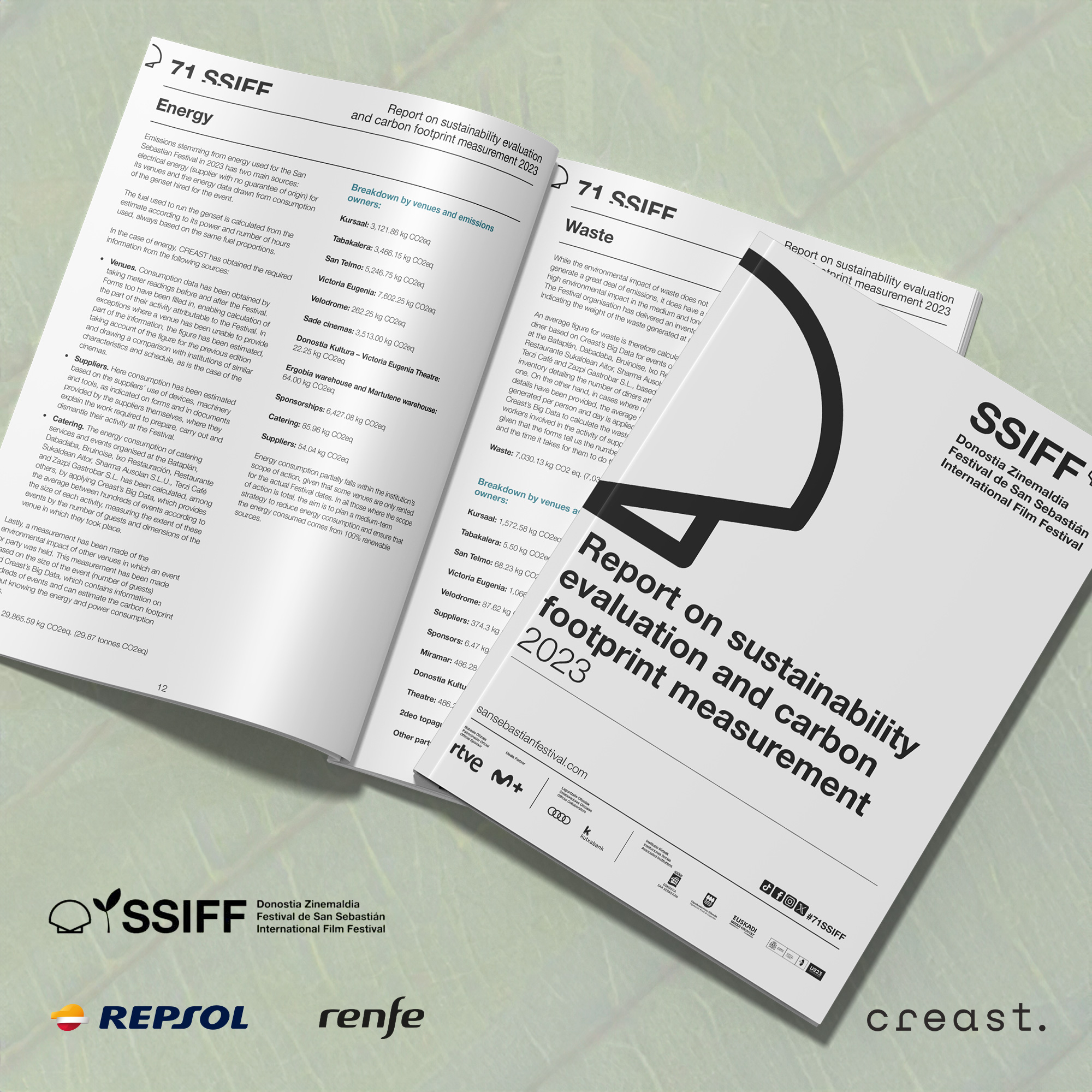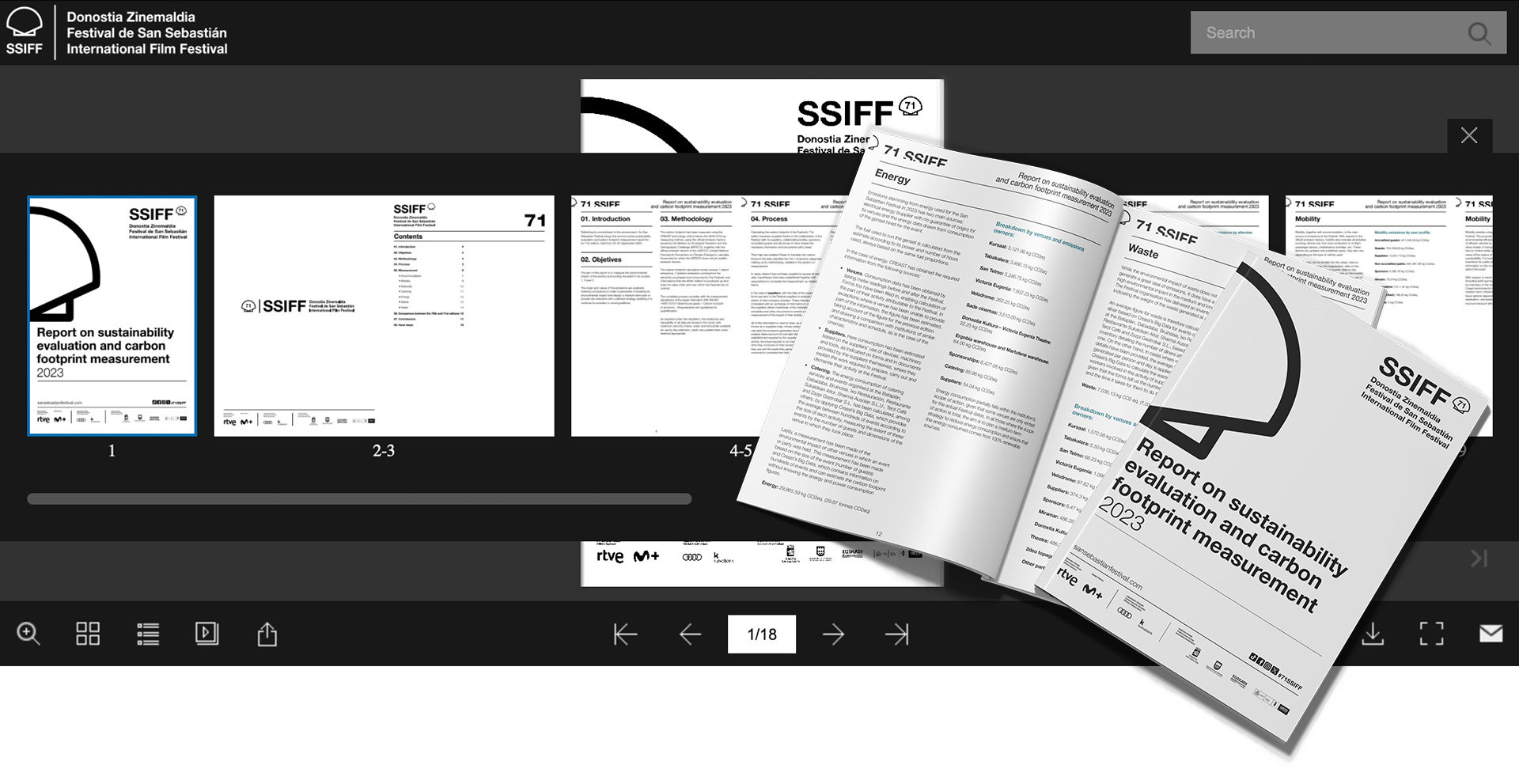The San Sebastián Festival managed to reduce its carbon emissions by 14% between 2022 and 2023, as can be seen from the report prepared by the consultancy company, CREAST. In 2022, the comprehensive study of the data from activity at the Festival established that its carbon footprint stood at 4,147 tons of CO2Eq, a figure that at the 71st Festival held in 2023 went down to 3,556.49 tons of CO2Eq. This represents a 14% reduction in emissions compared to the previous Festival.
For the third year running, the Festival has presented its sustainability and carbon footprint measurement assessment report, whose aim is to continue to forge ahead towards becoming a more environmentally sustainable festival. For the second time the report was drawn up by CREAST, the consulting company that the San Sebastián Festival has designed a five-years plan with to become a carbon-neutral festival in 2027.
Report on the 71st Festival (2023)
The measures that have already had a positive impact on the decrease in the carbon footprint include a reduction in paper-use, which has led to a 1.67-kg reduction in CO2Eq due to the replacement of the printed Festival catalogue by its digital version. For the third year running, the Gipuzkoa Provincial Council Sustainability department has also provided the Festival with 1,840 m2 of 100%-recycled and recyclable red carpets outside the Kursaal and the Victoria Eugenia theatre, an initiative thanks to which 2,334.74 kg of CO2Eq have been reduced. All this, together with the proposal to rent most of the materials and to prioritise second-hand purchases, has meant that the materials section has been the one that has decreased its footprint the most compared to the previous year (2022).
With regard to energy, at the closing gala for the 71st Festival the generators were powered by biofuel. The festival has also continued with the transition to LED lighting that started in 2021.
As for waste, for the second year running clearly marked recycling stations were set up at the different Festival sites, a measure that it is estimated led to the carbon footprint generated by waste being reduced by half.
As far as mobility is concerned, Audi, the official vehicle of the San Sebastián Festival, provides a mixed fleet which includes a third that are hybrid vehicles and another third that are electric vehicles. It is estimated that by using these kinds of vehicles emissions of about 33 tons of CO2Eq are avoided. At the 71st Festival the services transporting guests of the Festival have also covered 96,500 kilometres, unlike in 2021, a year when they amounted to approximately 120,000 kilometres. The collaboration with Renfe has also allowed for the optimization of non-polluting transport, while Repsol has participated with various initiatives, including the installation of more electric charging stations for automobiles.
Finally, with regard to light pollution, the Kursaal has reduced the number of hours that it is lit up and it is estimated that this has reduced its CO2Eq by approximately 30.23 tons.
For the second time the Festival also offset 84% of its carbon footprint by giving 25,000 euros to the Gipuzkoa Voluntary Carbon Fund launched by the Naturklima Foundation and Gipuzkoa Provincial Council’s Department of the Environment. This contribution was invested in projects to improve local green infrastructures to help to regenerate the functionality of the natural carbon sinks in Gipuzkoa, mainly its forests and seas.
Measures and programmes for the 72nd Festival (2024)
During the current year, the 72nd San Sebastián Festival will be focusing on internal mobility and on the mobility of people attracted by the event, one of the factors that has the most impact on the carbon footprint. To achieve this, it is working on an awareness-raising campaign to encourage accredited and non-accredited guests to choose more sustainable transport options, as well as also working on a series of internal measures that will be announced shortly and will directly lead to a reduction of the carbon footprint in this category.
In addition, a number of activities related to the climate context will also be organised. On the one hand, the Festival has established a partnership with the European Climate Foundation to reflect on new ways of representing the climate emergency and the ecological transition. This collaboration will take shape in the next few months and will have three core ideas: exhibition, training and dissemination.
As far as training is concerned, the Room Z at Tabakalera will be hosting two workshops that will be held on 3 May and 28 June, respectively. The first of these will have representatives from Another Way Film Festival and aims to provide basic knowledge about the work carried out to date in the field of sustainable narratives and about future challenges. The second workshop, run by the Climate Spring Training organisation and aimed at professionals in the fields of film creation (directing, scriptwriting, production, etc.), will have a second part in September during the Festival. It will focus on storytelling and on options to harness the narrative power of cinema and television to change the way citizens engage with and demand action on the climate crisis. If you are interested in taking part please enrol by e-mailing: eztabai@sansebastianfestival.com with your name, surname and ID number.
In Thought and Discussion, which forms part of the Z365 area of the Festival, productions to do with the environment will also be screened. This is the case with the film shown at the beginning of April within the framework of the Zinemaldia + Plus cycle, La croisade / The Crusade (2021), directed by Louis Garrel and screened in Perlak.







